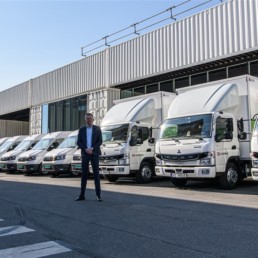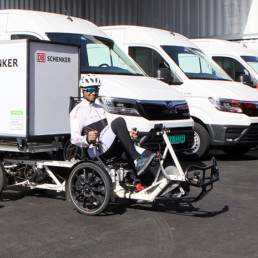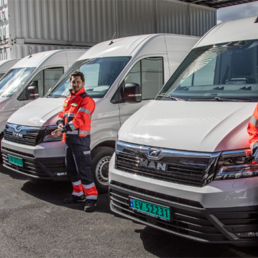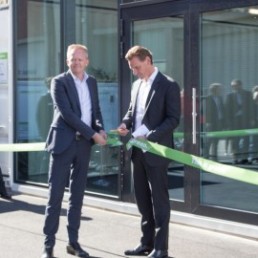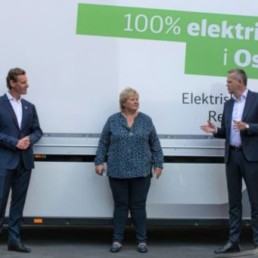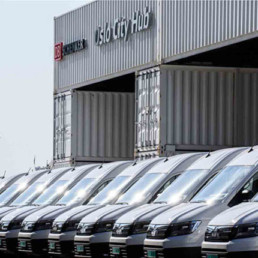On 8 May 2019, the same year that Oslo had the status of Europe's Environmental Capital, DB Schenker opened its first city hub for emission-free distribution of goods at Filipstad in Oslo, DB Schenker Oslo City Hub.
The centrally located terminal reduces Schenker’s CO2 emissions related to goods distribution in Oslo by almost 100% by means of electric trucks, electric vans and electric cargo bikes. With the help of a total of 23 electric vehicles that distribute around 1,000 shipments per day, Schenker reduces its CO2 emissions by approx. 400 tonnes per year. In addition, there is reduced traffic as a result of a more rational and efficient urban logistics.
DB Schenker Oslo City Hub is built using 45 shipping containers and has a footprint of approx. 720 sqm including niches for car parking. The terminal is designed for efficient cross docking of goods, and is equipped with 15 cargo ports. In addition, the terminal houses two offices, an area for cross docking and intermediate storage, as well as meeting rooms, a dining room and a cloakroom.
Focus on the environment and sustainable solutions in the transport sector has been given great attention in the DB Schenker Group.
– In Norway, we have prioritized environmental efforts for many years, and in recent years there has been significant investment in offering environmentally friendly logistics solutions for business and industry by investing in electric vehicles, says Lars Sveen, director of Domestic Land Transport in Schenker AS.
The business community and the company’s customers are increasingly demanding solutions that take better care of the environment. The market thus places stricter requirements on the carrier’s logistics solutions both in terms of sustainability and the environment.
DB Schenker Oslo City Hub is the result of a successful public-private partnership between Filipstad Utvikling (Cityhubs), the Port of Oslo, DB Schenker, MMW Arkitekter, Spesialcontainer and Oslo Municipality/Bymiljøetaten.
- Address: Filipstadveien 5d
- Client: DB Schenker
- Project completed:
May 2019 (phase I)/
February 2020 (phase II)
MILJØGEVINST & REDUSERTE KOSTNADER
100%
Omstilling fra diesel
til elektrisitet
2500
Tonn CO2 i redusert
utslipp pr. år
500
Færre lastebiler
på strekningen i 2020
